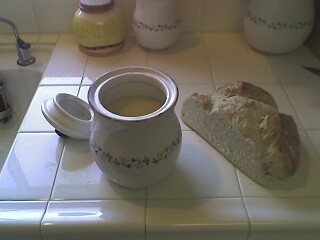Maintaining a Happy Vat of Ooze

Over the Memorial Day weekend, I managed to rev up my sourdough starter and bake two loaves of bread. My starter, which was given to me by a dear friend, has a bit of a history to it. In fact, it even has a name and consequently a preferred sex. 'Her' name is 'Melissa'. And she is named after my dear friend's great great grandmother, who migrated out to California from Virginia shortly after the California gold rush. This means Melissa is something over 150 years old, which isn't bad for a yeasty vat of grey ooze (In truth, she could be much older, since her life's history in Virginia is a bit unclear.), and yet she still hasn't retired. She still provides her family (and now my family too) with all the necessary bread and B vitamins we could possibly want.
Why, you may ask, am I writing about prodigous grey ooze on a lunar colonization blog? Because, it seems most likely that we will be hauling vats of grey ooze and similar vats of self-sustaining beneficial flora and fauna with us as we colonize the solar system. The thought that we'ld build a 'culture' up on the Moon or on Mars without leavened bread strikes me as absurd and quite dull (I can't imagine being impressed when offered matzohs or saltines with my moon meal).
Chances are, though, that the sourdough will hitch a ride with us out into space, that is unless we manage to sterilize ourselves completely before leaving. The reason being that a sourdough culture is comprised of various airborne yeasts and bacteria which will opportunistically start a micro-ecosystem in a batch of flour and water if given a chance. This may give some hint as to the complexity of even the most basic of our ecosystems. It is to wonder what micro-organisms might be critical to our survival that we haven't yet identified.
Interestingly, our vat of sourdough starter may give us some insight into ecosystem integration. Sourdough starter contains various bacteria and yeasts, living in solution, chomping on the sugars provided by the mixture's flour. To maintain their proper balance, the sourdough needs to be kept warm and fed regularly with fresh flour and water, lest it turn odd colors and become positively catatonic. Other ingredients, such as fats and animal proteins, need to be carefully avoided, lest other less-healthful organisms take over the batch. Honestly though, I'm not sure if balance is the right term.
We usually think that an ecosystem is something that once balanced, will stay balanced -- populations of creatures statically maintaining their numbers, but this is not what one sees in nature. My suspicion is that my sourdough starter is a dynamic system, choca-blok full of these various organisms vieing it out for system dominance. This is what evolution would tend to have us believe.
I suspect what maintains the 'ecological balance' in the sourdough is how the inputs are varied, and how the sourdough environment changes over time. As the sourdough environment ages from one feeding to the next -- in this case over the course of a few days -- perhaps various organisms get their chance in the dominance spotlight. This is certainly the case in the macro-world. While spending a year in Japan, I noticed that various insects seemed to have a time of year set aside just for them. In May, before the rainy season kicked in, the fireflies made their brief showing; by mid-summer, after the rainy season had passed, came the dragonflies and the cicadas; this was followed by a brief bout of green stink bugs; finally at the end of August and the start of September was the time to observe the preying mantises. By time-sharing, if you will, these various species of insects managed to share the dominance niche in their environment without completely overpowering it.
I suspect there is a lesson here, if we choose to accept it. The trick to creating healthy enclosed offworld ecosystems may be coming to terms with and navigating their dynamic natures.


1 Comments:
I ran into a fun link about beer, bread, and civilization. It's worthwhile to do a google search on the title as there are various theories that suggest a relationship between the rise of beer making and the the rise of western civilization. Theoretically, beer was the impetus that drove man to grow and cultivate grains, which led to everything else.
It would be unseemly for mankind to begin a civilization off of earth without the necessary beer and bread making 'technologies'.
Post a Comment
<< Home